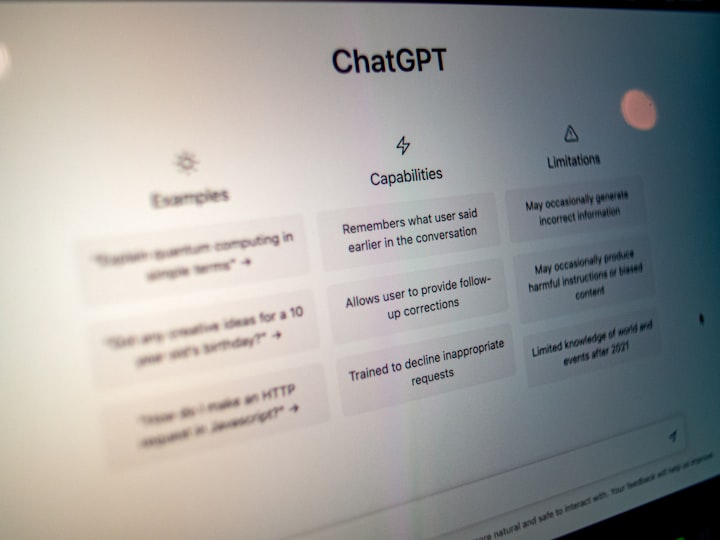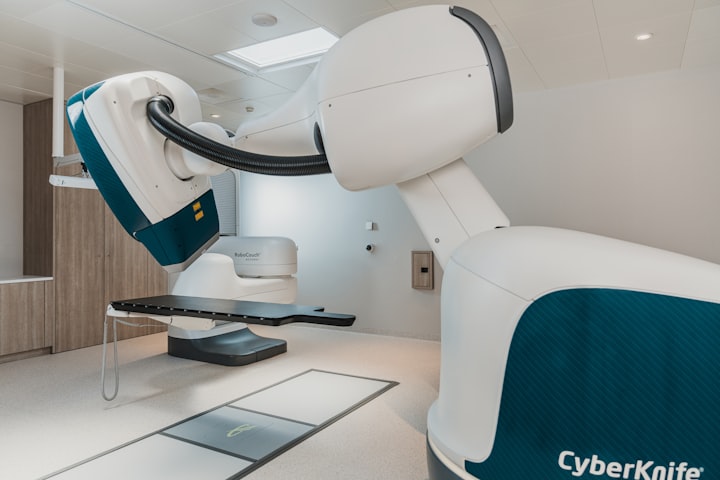The Future Of Chatbots Exploring Chatgpts Potential
Discover How AI Chatbots will change this world

Chatbots are getting smarter with AI and NLP. Introducing ChatGPTs, the advanced bots that learn from every interaction to become even more helpful. They have endless applications, from customer service to personal coaching. Let’s explore the exciting possibilities and challenges of this rapidly evolving field.
What Are Chatbots And How Are They Evolving?
Chatbots are becoming increasingly common in our daily interactions with businesses and services. But what exactly are chatbots, and how are they evolving? At their core, chatbots are computer programs designed to simulate human conversation through artificial intelligence techniques like natural language processing. They can communicate with humans via text or voice-based interfaces and help automate tasks ranging from customer support to e-commerce transactions.
One major trend in chatbot development is the rise of language models like OpenAI’s GPT-3 that use machine learning algorithms to generate more sophisticated responses. Unlike traditional rule-based approaches that rely on pre-programmed scripts, these models can understand the context and even generate original content based on a given prompt. This has significant implications for the future of chatbots as they become more human-like in their communication style.
As chatbots evolve, we can expect to see them integrated into more aspects of our lives, from healthcare to education. However, there are also concerns about the impact of AI-powered chatbots on employment and privacy. As such, it will be crucial for developers and policymakers alike to carefully consider the ethical implications of this technology moving forward.
ChatGPT Revolutionizing Conversational AI: The Power Within
Looking ahead, the rise of chatbots promises to further revolutionize the field by enabling even more advanced natural language processing capabilities. In turn, this could lead to new opportunities for chatbot applications across industries while also raising important questions about data ethics and ownership. Nevertheless, one thing is clear: the future of chatbots is bright. but also complex and challenging as we navigate this rapidly changing landscape.

The Rise Of ChatGPT And Its Impact On Chatbot Technology
As the world continues to move towards a more digital age, chatbots have become an integral part of our lives. They are no longer just simple automated systems that respond with pre-written messages but have evolved into sophisticated chatbot solutions. The rise of ChatGPT has been instrumental in this evolution.
ChatGPT is an advanced natural language processing model that can generate human-like text responses. It uses machine learning algorithms to analyze and understand user input, providing personalized recommendations based on their preferences. This technology has revolutionized the way we interact with chatbots by making them more intelligent and responsive than ever before.
The impact of ChatGPT on chatbot technology cannot be overstated. Online shopping experiences are now powered by these bots, which help customers navigate through product catalogs and make informed purchases. Moreover, customer service and support have also greatly benefited from this advancement as ChatGPT-powered bots provide real-time assistance, resolving issues quickly and efficiently.
ChatGPT and Copyright: Legal Implications of Chatbot Conversations and Responses
With the ability to learn from previous interactions, these chatbots can offer personalized recommendations tailored to individual needs. As such, businesses can use them to improve overall customer satisfaction rates while reducing operational costs associated with traditional customer support channels.
In conclusion (just kidding!), it’s clear that ChatGPT is changing the game for chatbot solutions in various industries like retail, healthcare, finance, etc. But what does this mean for the future? In the next section, we’ll explore how ChatGPT’s potential extends far beyond its current applications and could ultimately transform entire industries.
ChatGPTs Potential In Customer Service And Support
ChatGPT has taken the chatbot industry by storm, and its potential in customer service and support is undeniable. With its ability to understand natural language processing, ChatGPT can provide personalized responses that make customers feel heard and understood.
To fully grasp the impact of ChatGPT on customer service and support, we must first acknowledge the challenges that businesses face when it comes to providing top-notch assistance. Traditional methods such as phone calls or email exchanges can be time-consuming, frustrating for both parties involved, and often result in unsatisfactory resolutions. However, with ChatGPT’s advanced technology, customers can receive immediate assistance without having to wait on hold or send multiple emails back and forth.
How ChatGPT is Trained: The Learning Process Behind This AI Chatbot
Moreover, ChatGPT can also assist companies in gathering important insights about their customers’ needs and preferences through real-time data analysis. This information can then be used to improve products or services offered by businesses which will lead to increased customer satisfaction rates.
The implementation of ChatGPT in customer service and support not only benefit businesses but also enhances the user experience for consumers. By using alliteration techniques such as “Instant Interactions” or “Personalized Problem-Solving”, we can see how ChatGPT transforms tedious tasks into seamless interactions between individuals while increasing efficiency.
Looking ahead, there is no doubt that ChatGPT will continue to revolutionize the way we approach communication in business settings. In our next section, we’ll explore how this technology can further enhance the user experience in e-commerce. a vital sector where speedy response times are crucial for success.

How ChatGPT Can Improve User Experience In E-commerce
Chatbots have already proven to be an effective tool for customer service and support, but their capabilities don’t stop there. In fact, chatgpt has the potential to improve user experience in e-commerce significantly. The possibilities are endless; it could help customers find products they’re looking for more easily, offer personalized recommendations based on past purchases, or even assist with checkout processes.
By using natural language processing (NLP) technology, chatgpt can understand a customer’s needs and preferences better than ever before. This means that online shopping experiences can become more seamless and efficient, ultimately leading to increased sales and customer satisfaction.
ChatGPT for Business: Revolutionizing Your Company’s Operations with AI Chatbots
Imagine being able to ask chatbot questions about product features or availability without having to navigate through multiple pages on a website. With chatgpt, this is entirely possible! Additionally, by analyzing data from previous interactions with customers, chatbots can provide relevant information tailored specifically to individual users.
Of course, there are still some challenges that need to be addressed before chatbots can fully realize their potential in e-commerce. For example, ensuring accuracy and avoiding bias in NLP algorithms remains a concern. However, as technology continues to advance rapidly, these obstacles may soon be overcome.
As we move forward into the future of chatbots, it’s exciting to think about all the ways that they could revolutionize how we interact with businesses online. But beyond just improving our shopping experiences lies another critical area where chatbots could significantly impact healthcare and mental health support.

ChatGPTs Role In Healthcare And Mental Health Support
Chatgpt has the potential to revolutionize healthcare and mental health support. As more people turn to chatbots for their medical needs, it is important to consider how these technologies can be used effectively.
ChatGPT for Real Estate: Enhancing Customer Experience and Boosting Sales with AI
One of the key benefits of chatbots in healthcare is that they provide an accessible and convenient way for patients to get medical advice. Patients can ask questions about symptoms or medications at any time without having to wait for a doctor’s appointment. This means that patients who may not have access to traditional healthcare services due to distance or cost barriers can still receive quality care.
Moreover, chatbots are also being used as mental health tools. They offer an anonymous space where individuals can express themselves freely without fear of judgment or stigma. Chatbots can help reduce feelings of isolation by providing companionship and encouragement through personalized messages. In addition, chatbots can detect early signs of mental illness and connect users with appropriate resources like therapy or crisis hotlines.
While there are many advantages to using chatbots in healthcare, there are also ethical implications that need to be addressed. The next section will explore some of these concerns and discuss ways we can ensure the responsible use of this technology.
As we move forward into the future, it is clear that chatbot technology will continue to transform various industries including healthcare. By understanding its potential and limitations, we can work towards creating a world where everyone has equal access to quality care regardless of their circumstances.
The Ethical Implications Of ChatGPT And Chatbot Technology
Imagine that you just lost a loved one, and instead of receiving comfort from a person or even a pet, you turn to a chatbot. This scenario might seem far-fetched but with the advancements in chatgpt technology, it’s not impossible.
Can ChatGPT Replace Programmers? Examining the Impact of This AI Chatbot
However, as we explore the potential of chatbots like chatgpt, we must also consider their ethical implications. Here are some factors to keep in mind:
- Bias: Chatbots learn from data inputted into them, which means if biased data is fed into them, they can perpetuate harmful stereotypes.
- Privacy: As chatbots collect personal information about users, there is always the risk of data breaches or misuse.
- Responsibility: Who takes responsibility when something goes wrong? The developers who created the chatbot? The company that owns it? These questions need answers.
- Empathy: While chatbots are getting better at mimicking human conversation patterns, they still lack empathy and emotional intelligence.
As we continue to integrate chatbots and other types of conversational AI into our daily lives, these concerns become increasingly important. We must ensure that this technology is developed ethically and responsibly.
In terms of future developments and innovations in chatbot technology, there is much excitement. Some areas where we’re likely to see growth include:
- Improved natural language processing
- Increased use of machine learning algorithms
- Integration with virtual reality and augmented reality technologies
- Expansion beyond text-based communication
As exciting as all these possibilities are though, let’s remember that ethics should remain at the forefront of development. If done right, chatbots have the potential to revolutionize how we communicate and connect with each other — but only if we prioritize responsible innovation.

Future Developments And Innovations In Chatbot Technology
Ah, the future of chatbots. What a thrilling topic! I can feel the excitement building already. But in all seriousness, as much as we joke about these robotic conversationalists taking over the world and enslaving us with their witty banter, there are some pretty interesting developments happening in this space right now.
ChatGPT and the Future of AI Chatbots Potential Use Cases and Impact
First off, let’s talk about natural language processing (NLP). This type of technology is what makes it possible for chatbots to understand human speech patterns and respond accordingly. And while NLP has come a long way in recent years, there’s still plenty of room for improvement. That’s where machine learning comes into play — by feeding data into algorithms that allow them to learn from user interactions, chatbots will become even better at understanding and responding to our needs.
Another area of innovation in chatbot tech is personalization. Think about how frustrating it can be when you’re chatting with a bot and it doesn’t quite understand what you’re asking for. By using personalized data like your location or previous interactions with the bot, developers can create more tailored experiences that actually meet users’ needs.
Of course, we also have to consider the impact that chatbots could have on industries ranging from customer service to healthcare. While some people worry that bots will ultimately replace human workers altogether (cue inevitable Terminator references), others see the potential for collaboration between humans and AI-powered assistants.
Discover the Power of ChatGPT: Unleashing the Capabilities of This AI Chatbot
And finally, perhaps most excitingly, we’re starting to see an increase in cross-platform integration of chatbot technology — meaning that soon enough we might be able to interact seamlessly with bots across multiple devices and platforms.
All in all, the future looks bright (or bleak? Who knows!) for chatbots. As always with emerging technologies though, ethical considerations must remain top-of-mind as we continue down this path toward a more automated society.
Conclusion
Chatbots have come a long way from their early days of scripted responses. With the rise of ChatGPT, chatbot technology is rapidly evolving to provide more natural and personalized interactions with users. According to a recent study by Juniper Research, it is predicted that chatbots will help businesses save over $8 billion annually by 2022.
A Comprehensive Review: Is ChatGPT Safe for Your Workplace?
But beyond just cost savings, ChatGPT has the potential to revolutionize customer service in industries like e-commerce and healthcare. By providing empathetic and accurate responses, these chatbots can improve user experience and even provide mental health support. However, as we continue to develop this technology, we must also consider its ethical implications.
The future of chatbot technology is exciting but also presents challenges that we must approach thoughtfully. As entrepreneurs and innovators, it is our responsibility to ensure that these advancements are used for good while being mindful of privacy concerns and unintended consequences. Let us embrace the possibilities of ChatGPT while striving towards responsible innovation.
About the Creator
Sadman Sakib
Sadman Sakib is a marketing manager who is well-versed in Big Data, Digital Marketing, and Social Media. He is skilled in creating and implementing Digital Marketing Strategies that focus on audience engagement and acquisition/growth.






Comments
There are no comments for this story
Be the first to respond and start the conversation.